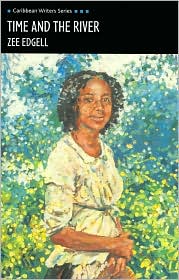Published in 2007, Time and the River is by far the most intriguing and enlightening work by the Belizean author Zee Edgell, author of highly acclaimed novel Beka Lamb. In the literary circles of United States, the slave narrative is an established form of writing that is read and discussed in the academia as well as in the popular sphere. What makes Time and the River an amazing tour de force is the complex thematic foci mobilized to enlighten us about the nature, functioning, and consequences of the Belizean slave economy. Based on real-life figures from Belizean history, the novels three main characters–Leah, Will, and Sharper–teach us not just the nature of human existence under oppression but also about the destructive power of slavery as an institution and its undeniable connection to the rise of early mercantile capitalism.
Leah, the main character, is probably the most complex character in the novel: she grows up as a slave and eventually, through her marriage to a slave owner, ends up inheriting more than three hundred slaves. Edgell, using court records and other archives, reconstructs for us the experiences of a female gendered subject who does earn her freedom but is not free enough to exercise her full agency as she does not free her slaves until after her death. Leah perplexes the readers as she defies our basic hope that when the oppressed are free of oppressors, they will not become oppressors themselves. But through her we learn the all-important lesson: slavery does not end simply because it is abolished or if one has gained one’s freedom. Instead, true human freedom arrives only when the structures of the material culture that underwrite slavery are altered and restructured.
Another important aspect of the novel is that it teaches us about a different kind of slavery: that of timber extraction instead of plantation slavery. The entire edifice of Belize’s colonial economy was built around the extraction and export of mahogany. The slaves were employed to locate, cut, and move the trees to the harbor for export to Europe. This mechanism involved housing slaves in forest encampments and created a hierarchy of jobs performed by the slaves: highest on this graded scale was the role of the spotters who located suitable mahogany trees in the thick forest. Thus, the slaves were not as closely monitored as their counterparts in the Caribbean cane economy or as those in the cotton fields of American south. The slaves were also free to move about in the towns and could also learn a trade and purchase their freedom. None of this implies that their experience of slavery was any less dehumanizing than that of their counterparts elsewhere.
Will and Sharper are two characters whose real historical names are used in the novel. Edgell’s reason, as shared with me in an email: “I kept the names Will and Sharper because a number of young people would know about them from one of their elementary history books, in which Will and Sharper are listed as Belizean heroes of the last known slave revolt in Belize, in 1820.” Will and Sharper also represent two different slave subjectivities: that of a captured slave and of the one who was born as a slave respectively. Will, the perpetual fighter, was captured in Africa when he was twelve and thus retains a part of his cultural memory of his free life. Throughout the novel, during all his revolts, he struggles with the loss of his cultural memory as he slowly starts forgetting the faces of his family, even that of his mother. His story then is also a personalized account of loss of a self through the process of slavery informing us what happens when a people are deracinated and thrown into a new world without any connection to their primary culture or a bank of narratives and stories essential to articulating an individual and collective identity.
On the whole, Time and the River is a fascinating exploration of selfhood, heroism, and traumas of slavery and a fitting tribute to the resilient spirits of those who never gave up their quest for freedom no matter what the circumstances. The novel also teaches us another important lesson: slavery is not over and continues in the form of wage slavery all over the world and that like Will and Sharper, we all must come together, even when the odds are impossible, to fight oppression wherever it exists.
About the reviewer:
Author of Constructing Pakistan (Oxford UP), Dr. Masood Ashraf Raja is an Assistant Professor of Postcolonial Literature and the editor of Pakistaniaat: A Journal of Pakistan Studies. Dr. Raja can be found at http://postcoloniality.org/


No comments :
Post a Comment